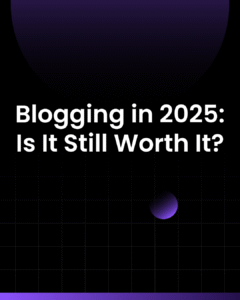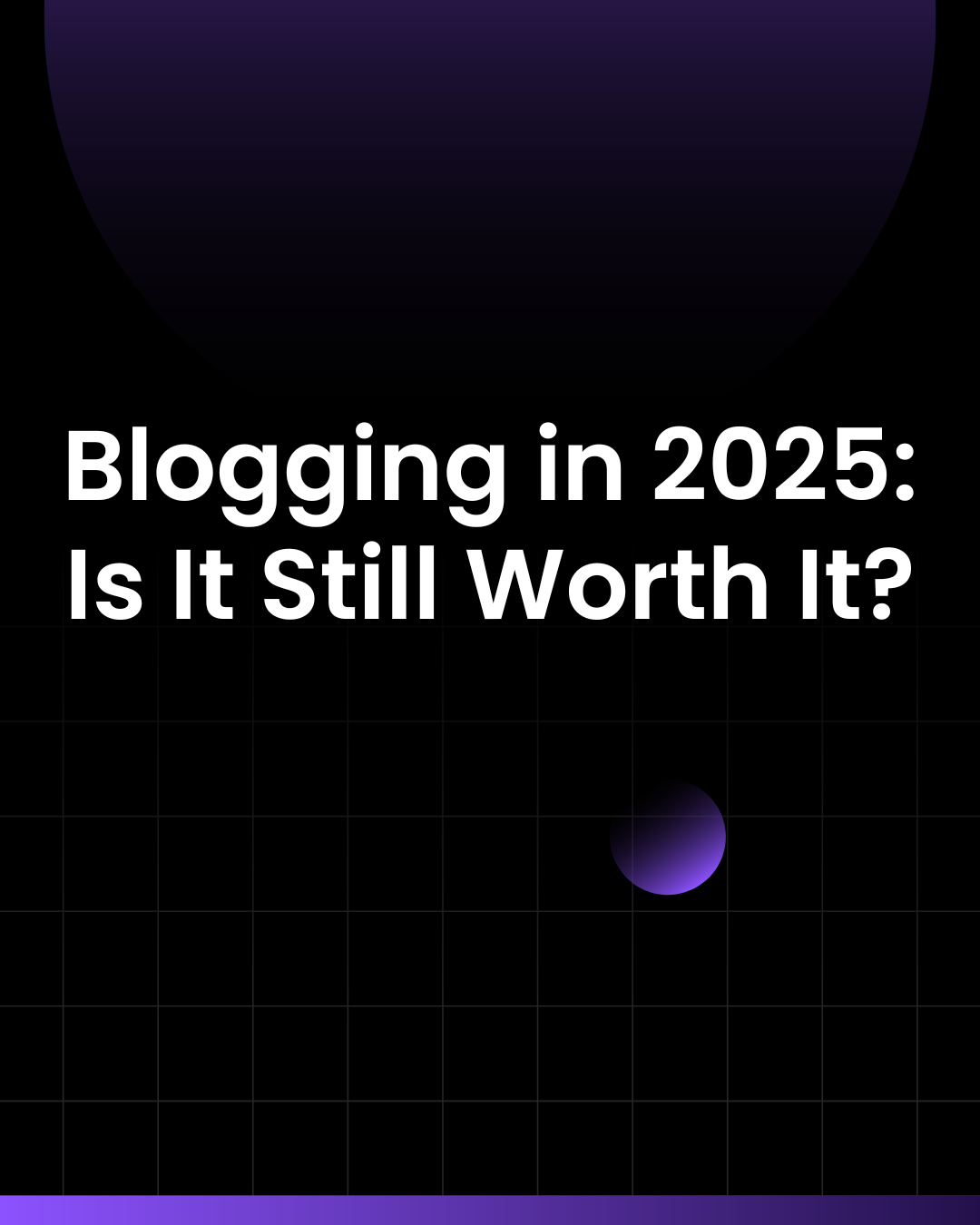Blogging in 2025: Is It Still Worth It?
Introduction
Every couple of years, the same query appears in online circles: “Is blogging dead? ” As new platforms emerge, new formats for short-form content, and AI-powered tools, it’s not surprising that there are many creators questioning whether blogging can survive 2025. But even with all the evolution in how people consume, blogging just keeps evolving and going strong in new forms. In fact, blogging itself has never been a stagnant medium.
It has grown with the internet itself, adapting in style, function, and monetization strategies to fit each new digital age.
As we enter 2025, the blogging scene is more competitive and lucrative than before. Although some old ways have diminished, new avenues of opportunity are opening up for those who can think ahead. This piece goes in-depth on the question of whether blogging is still worthwhile in 2025, delving into its past, current realities, challenges, and prospects.

The Evolution of Blogging
Blogging started in the late 1990s as an internet diary style. The first bloggers employed sites such as Blogger and LiveJournal to post personal thoughts, opinions, and experiences. The blogs were casual, text-based, and largely for personal use as opposed to business.
By the early 2000s, blogging had become an effective means of information exchange and specialized communities. WordPress became available in 2003, whereupon it instantly became the most widely used blogging platform in the world. With time, blogging grew from personal diaries to professional publishing. Companies saw that blogs could be used for marketing and customer interaction, and therefore the age of “content marketing” arrived.
The 2010s presented new challenges. Social media sites such as Facebook, Instagram, and Twitter started competing with blogs for eyeballs. YouTube came along with video blogging (“vlogging”), drawing audiences who liked watching rather than reading. Despite all that, blogging persisted by providing what short entries and fleeting videos could not: depth, lengthy authority, and perennial value.
By the 2020s, blogging had branched out into all sorts of formats—news blogs, niche authority sites, affiliate marketing blogs, and personal storytelling platforms. Today, with the rise of Substack, newsletters are a new type of blogging that’s returning the intimacy of a direct audience relationship.
In short, blogging never died. It just changed. And in 2025, it remains one of the most versatile content forms on the internet.
The Blogging World Today in 2025
So, who is blogging in 2025? The answer: plenty. From individual creatives to major corporations, blogging is still a central way to share ideas, teach readers, and generate revenue.
The most successful blogs today are extremely niche-specific. Rather than catchall broad subjects, dominant bloggers specialize intensely—no matter if it is personal finance, fitness, AI software, climate solutions, or lifestyle development. People want expertise, and search engines value it.
When it comes to platforms, WordPress remains the leader, with almost half of all sites on the planet being powered by it. Medium, Substack, and Ghost are close runners-up, however. Medium remains popular with thought leaders and amateur writers. Substack is known to be the place to go for newsletters with a monetization-first ethos. Ghost is suited to creators who prefer a self-hosted membership model.
Fascinatingly, micro-blogging sites like X (formerly Twitter) and Threads have had an impact on blogging by asking for shorter, bite-sized ideas. Yet they tend to support instead of usurp blogging. Most creators leverage micro-posts to gain notice, then invite readers to more detailed blog posts for substance and expertise.
Generally, the state of blogging in 2025 is healthy—but it’s different from how it was five or ten years ago.
Challenges Bloggers Face in 2025
Though blogging is by no means dead, it is by no means challenge-free. The greatest change over the past few years has been the proliferation of content created by artificial intelligence. Apps such as ChatGPT, Gemini, and Claude can write entire articles in mere seconds and fill the web with infinite posts. Although this facilitates higher efficiency, it also renders the web more competitive and cacophonous. It takes more than posting articles to stand out—brand development, originality, and human perspective are necessary.
Another hurdle is SEO (Search Engine Optimization). Google and other search engines are changing fast with AI-powered results, AI summarization, and conversational search experiences. That means old-school keyword stuffing or run-of-the-mill listicles no longer secure rankings. Authority, credibility, and originality are the new winners.
Last, attention spans are declining ever further. Readers are confronted with content across all media, and it becomes increasingly difficult to maintain them with lengthy pieces. Bloggers must now walk the tightrope between depth and readability, employing narrative, imagery, and multimedia to maintain focus.
These obstacles can seem overwhelming, yet also illustrate why blogging is still worthwhile: overcoming them forces creatives to push the quality of their work higher.
Why Blogging Still Matters
In spite of the challenges, blogging is still one of the most powerful content creation methods in 2025. Here’s why:
Authority and Trust – Blogging is a virtual home where creators can demonstrate expertise. Unlike ephemeral social media posts, blogs build authority over time. Readers trust in-depth, well-researched content more than a brief TikTok video.
Evergreen Value – Blogs can drive traffic and revenue for years. A properly optimized article written today can continue to draw readers in 2027. This extended shelf life is something that most social networks can’t provide.
Monetization Potential – Blogging provides varied revenue streams: affiliate marketing, ads, digital products, and memberships. Despite AI clogging up the airwaves, distinctive voices continue to resonate with paying crowds.
Creative Freedom – Unlike algorithm-controlled platforms, blogs provide creators complete ownership of what they produce. This autonomy makes blogging a safer long-term commitment.
In other words, blogging is not only alive—it’s best positioned as a platform for digital power and business expansion.
Blogging vs. Other Platforms
With so many platforms at hand, how does blogging stack up in 2025?
YouTube provides reach and engagement but demands high video production abilities.
TikTok & Instagram are great for immediate visibility, but content is short-lived.
Newsletters (on Substack, ConvertKit, etc.) provide immediate connection with your audience but can be restrictive in contrast to a full website.
Podcasts are on the rise but are less discoverable than written blogs.
The special strength of blogging is its searchability and longevity. A well-structured blog post can stay ranked on Google for years, but a TikTok video could be gone from a week’s feed. Blogs are the “hub,” but other platforms are spokes that lead audiences back to it.
Monetization in 2025
If blogging remains relevant, then the next big question is: Can you still make money from it? The answer is yes—if you adapt.
Affiliate Marketing remains the most lucrative method. Niche recommendations and product reviews still generate income when combined with SEO.
Online Courses & Digital Products are thriving, particularly in niches such as self-improvement, AI, and productivity.
Memberships & Paid Communities are increasing rapidly. Bloggers use platforms like Patreon, Ghost, or Substack to monetize loyal readers by charging them as paying members.
AI-Helped Blogging Companies are on the rise, where authors leverage AI to grow quicker without losing their individual voice.
Monetization in 2025 involves fewer display advertisements and more constructing a multi-stream financial system. Top bloggers approach their blogs as virtual companies.
The Role of AI in Blogging
AI is a challenge and a tool. On the one side, it generates content overload. On the other, it enables bloggers to accomplish more in fewer hours.
AI assists with:
Research → Quickly summarizing complicated subjects.
SEO Optimization → Providing keyword recommendations and readability enhancement.
Content Generation → Creating outlines or even complete posts.
Productivity → Simplifying monotonous tasks such as formatting, editing, and scheduling.
The secret in 2025 is balance. AI alone produces generic content. The winning formula is blending AI effectiveness with human creativity, experience, and storytelling.
Future-Proof Blogging Strategies
To thrive in 2025 and beyond, bloggers require strategies that differentiate:
Develop a Strong Personal Brand – Readers engage with people, not anonymous websites.
Emphasize Storytelling – Facts are everywhere, but personal stories build loyalty.
Build an Email List – Direct audience ownership is worth more than social followers.
Diversify Content – Alternate long-form articles with short posts, visuals, and videos.
Double Down on Authenticity – Be authentic. Readers can detect generic AI text from true human voice.
These tactics help a blog remain relevant withstanding changing platforms and algorithms.
Case Studies: Blogging Success in 2025
Take fitness bloggers who now pair AI-based apps with personal training posts. Their sites are lead generators to subscription training.
Or technology bloggers who utilize AI in reviewing software but continue to offer hands-on testing and personal opinions AI cannot match.
Even lifestyle bloggers who write about real life experiences—minimalism, family life, travel—still engage readers fed up with hyper-edited social posts.
These instances demonstrate that blogging success is not a matter of competing with the machine but rather of providing what machines cannot: perspective, nuance, and humanity.
Conclusion
So is blogging in 2025 worthwhile? Absolutely. But it’s no longer a matter of scribbling down random diary entries hoping for traffic. It’s a matter of strategy, authenticity, and flexibility.
Blogging continues to be a foundation for authority, income, and community building. It has survived every digital shift—from the rise of social media to the explosion of video and AI. And it will continue to evolve.
If you’re starting a blog in 2025, approach it with long-term vision. Focus on your niche, use AI as an assistant—not a replacement—and connect with your readers authentically. The future of blogging is not about being the loudest. It’s about being the most trusted. And in an era of information overload, trust is the ultimate currency.
